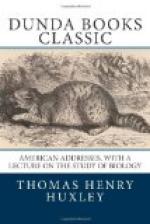Those who are acquainted with the existing systems of medical education will observe that, long as is the catalogue of studies which I have enumerated, I have omitted to mention several that enter into the usual medical curriculum of the present day. I have said not a word about zoology, comparative anatomy, botany, or materia medica. Assuredly this is from no light estimate of the value or importance of such studies in themselves. It may be taken for granted that I should be the last person in the world to object to the teaching of zoology, or comparative anatomy, in themselves; but I have the strongest feeling that, considering the number and the gravity of those studies through which a medical man must pass, if he is to be competent to discharge the serious duties which devolve upon him, subjects which lie so remote as these do from his practical pursuits should be rigorously excluded. The young man, who has enough to do in order to acquire such familiarity with the structure of the human body as will enable him to perform the operations of surgery, ought not, in my judgment, to be occupied with investigations into the anatomy of crabs and starfishes. Undoubtedly the doctor should know the common poisonous plants of his own country when he sees them; but that knowledge may be obtained by a few hours devoted to the examination of specimens of such plants, and the desirableness of such knowledge is no justification, to my mind, for spending three months over the study of systematic botany. Again, materia medica, so far as it is a knowledge of drugs, is the business of the druggist. In all other callings the necessity of the division of labour is fully recognised, and it is absurd to require of the medical man that he should not avail himself of the special knowledge of those whose business it is to deal in the drugs which he uses. It is all very well that the physician should know that castor oil comes from a plant, and castoreum from an animal, and how they are to be prepared; but for all the practical purposes of his profession that knowledge is not of one whit more value, has no more relevancy, than the knowledge of how the steel of his scalpel is made.
All knowledge is good. It is impossible to say that any fragment of knowledge, however insignificant or remote from one’s ordinary pursuits, may not some day be turned to account. But in medical education, above all things, it is to be recollected that, in order to know a little well, one must be content to be ignorant of a great deal.




